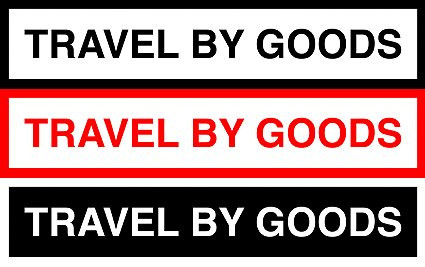Travel By Goods
Настоящее имя: Travel By Goods
"In an isolated section of Art Cologne 2010, among art books, artists’ books, and artists’ multiples, I came across a record with a curious collage on its cover. A triangular vignette revealed the contents: 12" White Label Arthur Boto Conley’s Music Workshop #01 Trance & Glasses. Though my chosen form of consuming art has almost always been limited to looking, paying twelve euros for an album felt natural enough. Back home, I listened to my purchase and leafed through the album insert. Images of ornate, pre-modern vases and people in states of trance populate all but one page. The final page describes Arthur Boto Conley’s adventures in India, Bali, Morocco, and Haiti in the early 80s, when he traveled around with a programmable drum machine and a bass synthesizer recording music with locals. The story unfolded to the A-side’s deep, steady bass; crunchy hi-hats; and recurrent, ethereal melody. Conley, following in the vein of Dutch ethnomusicologist Jaap Kunst, worked with musicians who played at healing ceremonies and vodou rites. One of the melodies, I read, was recorded by a gamelan orchestra in south-west Bali. On the B-side’s first track, a Hammond organ accompanies an ecstatic symphony of Moroccan karkaba cymbals. Conley’s synth, a Roland TB-303, dominates the second track; the driving bass tones were designed in collaboration with Haitian drummers to mimic the traditional »moose call« technique. The album itself contained little information about its origins, so I took to Discogs and Youtube, where my searches brought up a video featuring the second B-side track uploaded by the user »bontecou« (a puzzling reference to one of the titans of post-war American sculpture, Lee Bontecou). The additional information below the video explained that the album was the first release from Travel By Goods, distributed by wordandsound in Hamburg. The label’s website revealed nothing further. That summer I visited the Golden Pudel Club in Hamburg, well-known for fostering local electronic music as well as contemporary art. It was during Pudel Art Basel, a bizarre art sale in honor of the big brother of all art fairs in Basel, Switzerland. Just inside the entrance, I recognized something: on the poster advertising the event was an image of an amphora vase just like those in the album insert. I managed to meet Stefan Marx, the artist who made the posters, but it turned out he had not taken the image from the album insert. Although the visit to Hamburg had not revealed any more about Travel By Goods and Arthur Boto Conley, I soon stumbled back onto their trail at the Berlin project space Note On. At an exhibition organized by curator Stephanie Seidel spotlighting subcultural music production in and around Germany over the past few decades, I found a new release from Travel By Goods, Arthur Boto Conley’s Music Workshop Presents Clifford Trunk,the fourth from the label. According to the insert, the album is a re-issue of three tracks produced in the mid-80s by Clifford Trunk, an architect who worked with Italian designer Ettore Sottsass’ Associati. Conley met Trunk in 1986 at the legendary Ratinger Hof bar in Düsseldorf, where the ethnomusicologist had travelled to research the eccentric musician Xaõ Seffcheque. The tracks, which were taken from one of Trunk’s homemade cassette tapes, make use of 707 drum machine and a Wasp synthesizer. On the A-Side, titled »sedersi« after the Italian word for »sit«, a sweet, synthetic melody flows in and out against a backdrop of sub-bass and a steady hi-hat section. The B-side, »ballare«, meaning »dance«, starts off with an upbeat groove then cuts back and forth between airy twirls and an atmospheric gloom. The second track, an absolute standout, delivers heavily textured synths against driving, energetic drum and bass lines. Judging by these two remarkably impressive finds, I eagerly anticipate unearthing the still-elusive second and third records released by the mysterious scientist Conley and Travel By Goods."
John Beeson, Spike Art Quarterly, Vienna, 2012
